The Best Diet Before Embryo Transfer to Increase Fertility Chances
Fertility Treatment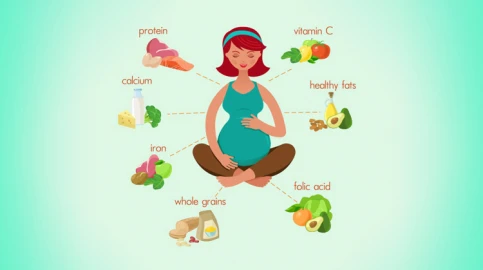
Having a proper diet before embryo transfer can play a significant role in the success of the IVF treatment. One of the success factors of pregnancy through IVF is maintaining hormonal balance with the help of organic and healthy foods.
Although there is no difference between natural pregnancy and IVF pregnancy in terms of diet, knowing what to eat before embryo transfer can increase the success chance of IVF. In this article, we outline general foods to eat before embryo transfer, what to eat for breakfast before embryo transfer, and what to avoid before this procedure.
Does Diet Affect Fertility During IVF?
A successful IVF procedure requires not only medical interventions but also lifestyle factors like diet. A balanced and healthful diet can increase the likelihood that an IVF procedure will be successful. Consuming a diet high in fruits, vegetables, whole grains, lean meat, and healthy fats can help increase fertility and general health. On the other hand, a diet high in processed foods, saturated fats, and sugar can negatively impact fertility. To increase their chances of becoming pregnant, patients undergoing IVF treatment should talk to their doctor about any dietary concerns.
What to Eat before Embryo Transfer?
Having a healthy body and a receptive uterus is the key to pregnancy. Many IVF specialists are confident that breaking unhealthy habits, changing your lifestyle, and having a proper diet before IVF transfer can significantly impact your chance of having a baby through this method of assisted reproduction.
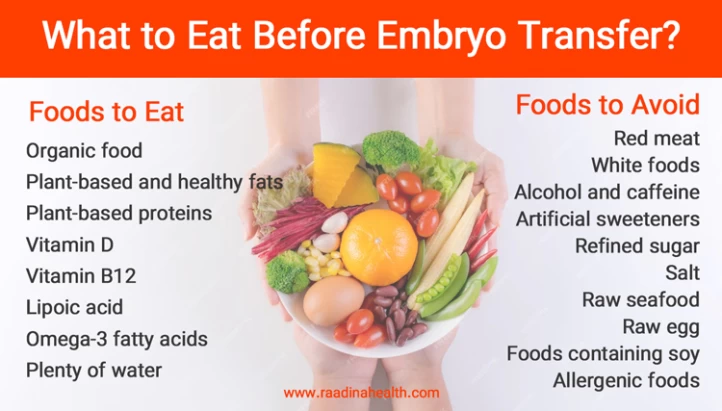
So, following the succeeding instructions for 3-6 months before embryo transfer is recommended to have a successful IVF. Food to eat before embryo transfer, known as IVF Diet, can include a variety of nutrient-rich options:
- Organic food
- Plant-based and healthy fats
- Plant-based proteins
- Vitamin D
- Vitamin B12
- Lipoic acid
- Warm and easy-to-digest foods
- Omega-3 fatty acids
- Plenty of water
By adhering to a balanced and nourishing diet before embryo transfer, individuals undergoing IVF can create an optimal environment for successful implantation and pregnancy.
Organic food
Organic foods reduce the risk of developing pregnancy diabetes, preeclampsia, and congenital disorders as they lack harmful chemicals and pesticides. So, consuming organic food before embryo transfer and including it in your diet after the procedure can help you have a more comfortable pregnancy.
Plant-based and healthy fats
Patients should avoid saturated and trans fats (trans-unsaturated fatty acids) before embryo transfer, but healthy fats are necessary for hormone synthesis. Foods such as avocados, salmon, olive oil, coconut oil, nuts, and seeds—especially sesame, chia, and flax seeds—are rich in healthy fats.
Saturated fats found in butter, biscuits, sausages, bacon, salami, chorizo, cheese, fatty meat, white chocolate, puddings, etc., decrease the number of mature eggs produced by the ovaries. Since having more mature eggs accelerates the chance of pregnancy through IVF, it is important to include plant-based and healthy fats in your diet.
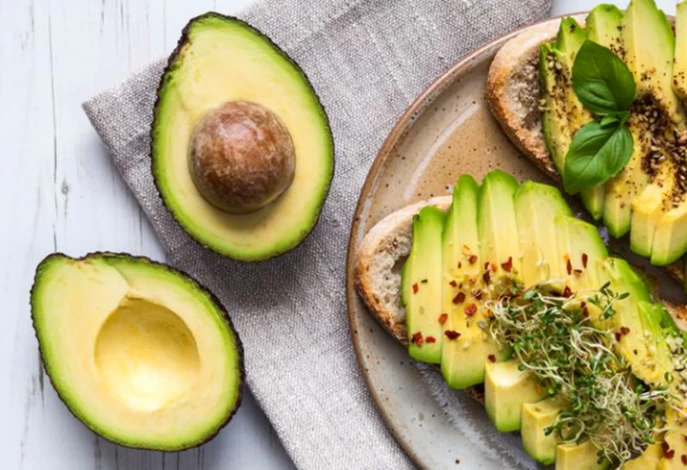
Plant-based proteins
Plant-based proteins increase the number of blood cells and, therefore, warm up the body and improve the general health condition of the mother. For this reason, adding this protein to your diet for IVF is better than avoiding animal proteins and raw foods before embryo transfer. Foods such as leafy greens, kale, collards, spinach, carrots, pumpkin, sweet potatoes, tofu, soya, broad bean, gluten-free whole grains such as brown rice and quinoa, etc., are rich in plant-based proteins and should be added to your before embryo transfer diet.
Vitamin D
Vitamin D is crucial for producing sex hormones, maintaining hormonal balance, and helping ovulation. Usually, vitamin D can be found in cod liver oil, fatty fish, eggs, dairy products, and sunlight.
Vitamin B12
Taking vitamin B12 reduces the risk of miscarriage and strengthens the endometrial lining. The deficiency of this vitamin may cause irregularity in the ovulation process or even stop it. Therefore, by consuming foods such as cheese, eggs, caviar (fish roe), fish, beef, mutton, etc., you can prevent such complications and increase the chance of pregnancy through IVF.
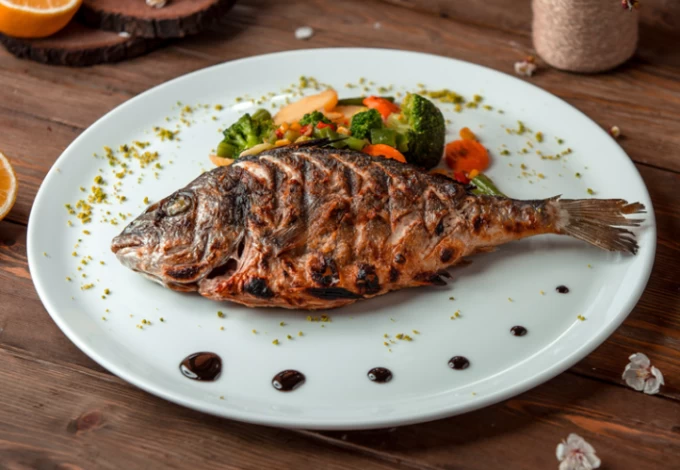
Lipoic acid
Among the foods to eat before embryo transfer, lipoic acid is of great importance. In fact, this is an antioxidant that not only increases the quality and motility of the sperm but also protects women's reproductive organs. Lipoic acid is found in spinach, red meat, broccoli, Brussels sprouts, tomatoes, carrots, and potatoes.
Warm and easy-to-digest foods
It is very important to include warm and digestible foods in your diet before embryo transfer. Having fresh, warm, and fast-digesting foods causes the body to use less energy for digesting and saves energy for performing more critical activities such as implantation.
On the other hand, cold and slow-digesting foods such as ice cream, cold smoothies, raw vegetables, etc., take a lot of energy from the body to be digested; thus, less energy remains for the IVF process in the body. You can increase the chance of successful embryo transfer by eating fast-digesting foods and saving energy.
Omega-3 fatty acids
Omega-3 fats are necessary for developing the fetus's brain and retina. Also, they prevent pre-term delivery and increase breast milk volume. So, it is recommended to use omega-3 before embryo transfer to prepare your body for implantation and have a healthier baby.
Omega-3 fats are widely found in the oil of some fishes, such as sardines, salmon, and mackerel. However, since these oils have toxins such as heavy metals and dioxins, they should be used twice weekly. You can get the rest of your omega-3 proportion from toxin-free supplements, walnuts, chia seeds, eggs, pumpkin, soybean oil, etc.
Plenty of water
Before starting the IVF process, get used to drinking at least three liters of water daily. You can also drink fruit juices, coconut water, or other fresh drinks to stay hydrated because hydration accelerates the absorption of nutrients.
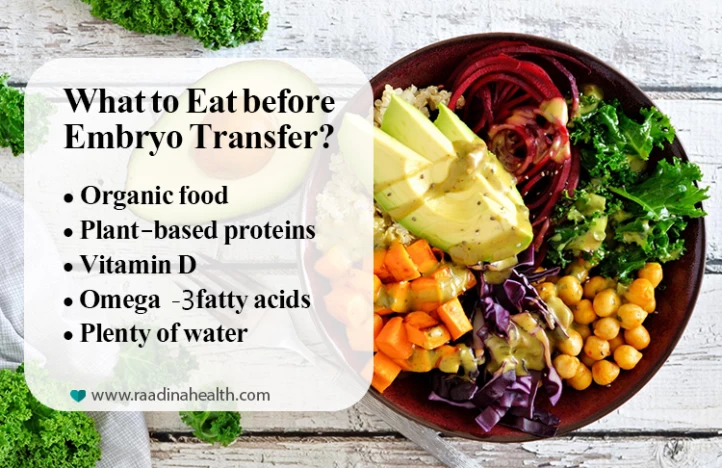
Foods to Avoid Before IVF Embryo Transfer
Before IVF embryo transfer, you should avoid certain foods to increase the chance of pregnancy. In the following, some of the foods that shouldn't be in your IVF diet are mentioned:
- Red meat
- White foods
- Alcohol and caffeine
- Artificial sweeteners
- Refined sugar
- Salt
- Raw seafood
- Some types of cheese
- Raw egg
- Foods containing soy
- Allergenic foods
Red meat and its products
Although red meat is a rich protein, iron, and zinc source, overeating it and its products can cause blastocyst formation during embryo implantation. It is advised that before and after embryo transfer, you should have red meat just once or twice a week. Notably, the meat and its products should be cooked entirely without traces of blood.
White foods
White and refined foods such as white bread, white rice, white pasta, white potato, and white sugar are slow-digesting, so they should be substituted with gluten-free whole-grain bread, brown rice, whole-grain pasta, red potato, and honey.
Of course, not all white foods should be avoided before embryo transfer; for instance, pears, jicama (Mexican potato), ginger, cauliflower, cabbage, white onions, garlic, mushrooms, tofu, and white corn can increase the receptivity of the uterus.
Alcohol and caffeine
Usually, women who drink alcoholic beverages have irregular ovulation and less chance of pregnancy through IVF. Suppose you are wondering when to stop drinking before frozen embryo transfer. In that case, you should know that drinking any sort of alcoholic beverage is prohibited from four weeks before embryo transfer, whether using a fresh or frozen embryo.
Also, caffeinated drinks such as coffee, black tea, Cola soda, and energy drinks should be limited to 200 milligrams (one cup) a day from a month before embryo transfer because caffeine can lead to miscarriage and reduce the embryo's blood supply.

Artificial sweeteners
Artificial sweeteners are food additives that sweeten foods and drinks but usually have less energy and calories than sugar-based sweeteners. Although artificial sweeteners prevent weight gain, they can disrupt the IVF process. A few months before IVF embryo transfer, it is better to use sucralose-based sweeteners or other natural sweetening syrups, especially honey.
Refined sugar
Even a tiny amount of refined sugar quickly increases blood sugar levels. Consuming too much sugar leads to weight gain, insulin resistance, diabetes, and high blood pressure, lowering the chance of pregnancy through IVF.
Salt
Although salt plays a crucial role in reproduction and embryo bone mineralization, it should be limited to the maternal diet. Having more than 6g of salt daily can cause high blood pressure and endanger the embryo's life. So, the mother should control her salt intake for months before embryo transfer. Pay attention to the fact that processed and fast foods contain more salt than your body needs. Therefore, you should probably cut out these foods until after the pregnancy.
Raw seafood
Almost a year before embryo transfer, you should avoid having farmed fish because they may have been exposed to pollutants and remove raw or mercury-containing fish, such as shark, swordfish, sushi, etc., from your diet because mercury sticks around in the body for an extended period.
However, since fish and shellfish are rich in protein and heart-healthy omega-3, you can have them once or twice a week, but they should be thoroughly cooked.
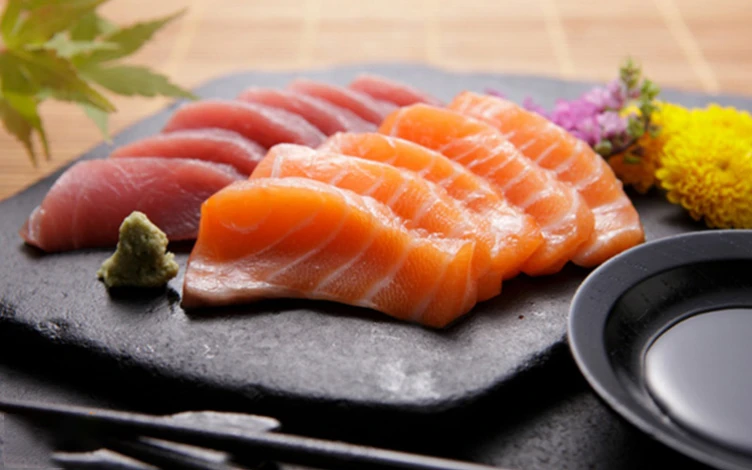
Some types of cheese
Despite the many advantages of dairy products, some cheeses, such as blue or soft ones, should not be used before embryo transfer as they have some bacteria that can cause infection. Consuming unpasteurized milk before IVF embryo transfer and during pregnancy is also not recommended. However, having yogurt and whole milk increases the chance of a successful pregnancy.
Raw egg
Due to the salmonella virus, raw eggs can cause food poisoning and should be avoided before embryo transfer.
Foods containing soy
Processed foods containing soy, such as soy protein powder, soy milk, soy cheese, soy burgers, soy chips, and soy meat, cause hormone imbalance and should not be used before and after embryo transfer.
Allergenic foods
Some foods to eat before IVF transfer, such as tomatoes, kiwis, eggplants, and strawberries, cause allergies in many people. It would help if you refrained from consuming them in the days before, during, and after the embryo transfer.
We should note that eating allergenic foods stimulates the body's immune response against allergens and anything foreign to the body. If the immune system detects the transferred embryo as a harmful agent, it may kill the embryo and the allergens.
Why is Proper Diet Important Before IVF Embryo Transfer?
After transfer, the embryo attaches to the uterus wall (endometrium lining) and receives oxygen and nutrients from the mother's blood. So, the endometrium lining plays a crucial role in successful IVF. Women with thin endometrium usually have a lower chance of natural and IVF pregnancy.
In addition to hormone therapy, following a specific before-embryo transfer diet is important, as having a proper diet before embryo transfer can thicken the endometrium wall and increase the progesterone level in the body (the hormone that prepares the uterus lining for pregnancy). Read on to learn what foods to eat before embryo transfer to increase progesterone in your body.
Breakfast Before Embryo Transfer
Eating a healthy breakfast before going for an embro transfer is important to ensure you are giving your body the energy and nutrients it needs to support the procedure. A balanced diet can be helpful for regulating blood sugar, weight and your overall well-being, which is so important for a good transfer.
Choose a high protein, healthy fat, complex carbohydrate based breakfast to keep your energy levels up throughout the day. We also advocate for food-related sources of vitamins — such as eggs, whole grains, fruits and yogurt — so some great vitamins and minerals can help support the reproductive system as well.
Its also important to stay hydrated, by drinking lots of water or herbal tea to make sure your hydration levels are optimal. And don’t forget: a nutritious breakfast is the best way to start your morning and set the tone for a great day.
What to Eat the Night Before Embryo Transfer?
An anti-inflammatory diet the day before embryo transfer is a good start for a healthy IVF diet. 8-12 hours before embryo transfer, have a light and warm soup with a glass of fresh juice and get some rest. Do not eat fast foods, sugary or salty foods, and processed or canned foods the night before the transfer, as they can cause digestive problems and lower the chance of pregnancy.
How to Thicken Uterine Lining for IVF?
As mentioned earlier, endometrial receptivity plays an important role in increasing IVF success. The majority of women dealing with infertility suffer from thin uterine lining due to taking birth control pills, obesity, aging, and shortage of estrogen hormone in their blood. Increasing endometrial thickness needs medications and extra lifestyle modification; however, you can thicken your uterine lining during the IVF cycle by eating foods containing L-arginine. This amino acid is widely found in poultry, fish, dairy, and red meat. So, you must add this compound to your before-embryo-transfer diet to increase your endometrial lining and its receptivity
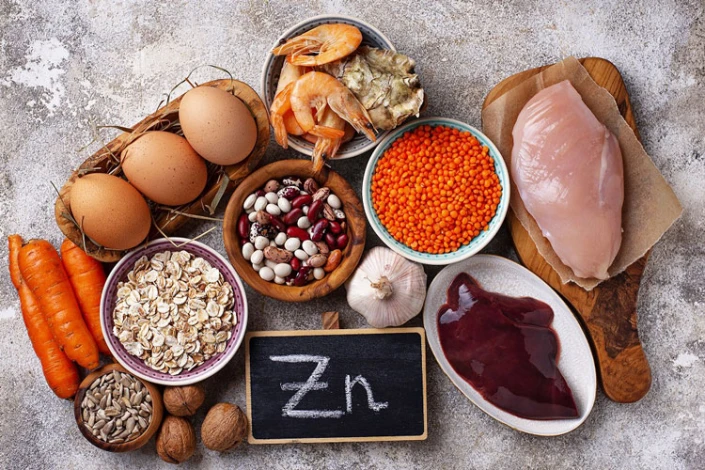
Conclusion
In general, having a proper IVF diet concerning the food to eat before embryo transfer helps embryo implantation and increases the chance of pregnancy. Recent investigations have shown that women with more vegetables and fresh fruits, whole grains, legumes, olive oil, fish, and less red meat in their IVF diet have a higher chance of getting pregnant.
Raadina Team offers you special embryo transfer packages, which include booking doctor's appointments, applying for a medical visa, and booking suitable and affordable accommodations.
If you wish to use the IVF method in Iran, contact Raadina Co. for more information about the best fertility clinics in the country and the price of this operation in Iran.
FAQs
1) Is it Safe to Eat Chocolate after Embryo Transfer?
In general, enjoying chocolate in moderation following embryo transfer is considered safe. Dark chocolate, in particular, may offer health benefits due to its antioxidants. However, consider the following:
- Caffeine: Chocolate, especially dark chocolate, contains caffeine. While moderate caffeine intake is usually safe during pregnancy, monitor caffeine consumption, including other sources like coffee or tea.
- Sugar: Watch the sugar content in chocolate, as excessive intake isn't ideal during pregnancy. Opt for dark chocolate with higher cocoa content, which often has less sugar than milk chocolate.
- Individual Sensitivity: Individuals may have varying reactions to foods. If you have concerns or known sensitivities to chocolate, consult your healthcare provider.
2) How does the consumption of caffeine and alcohol influence IVF outcomes?
Excessive intake of caffeine and alcohol may have adverse effects on IVF results. High levels of caffeine have been linked to fertility issues and can potentially hinder embryo implantation. Similarly, alcohol consumption can disrupt menstrual cycles and compromise the quality of eggs and sperm. It is advisable to limit or abstain from these substances during IVF treatment to optimize chances of success.
3) Does dairy consumption impact IVF success?
There is evidence suggesting that dairy products, particularly those derived from whole milk, may have a positive impact on fertility. These products provide essential nutrients such as vitamins B2, B12, A, choline, zinc, magnesium, selenium, and iodine, which are vital for reproductive health and fetal development. However, individual tolerance to dairy varies, and its consumption should be part of a balanced diet tailored to one's specific dietary needs and health conditions.
4) Can pineapple aid in embryo implantation?
The belief in pineapple's ability to enhance embryo implantation stems from its bromelain content, an enzyme with anti-inflammatory and blood-thinning properties. While anecdotal evidence within fertility communities supports this notion, scientific research on bromelain's direct effect on embryo implantation is limited. You can add a pineapple to your diet, but it should not be relied upon as a definitive factor in IVF success.
5) What is the importance of hydration during IVF treatment?
Proper hydration is essential during IVF to promote optimal blood flow to reproductive organs and facilitate the development of healthy eggs and sperm. Water plays a crucial role in hormone and nutrient transport necessary for reproductive processes and can create a favorable uterine environment for embryo implantation. Consuming at least eight glasses of water per day is generally recommended during IVF treatment.


 WhatsApp
WhatsApp
 Telegram
Telegram
 Facebook
Facebook
 Email
Email

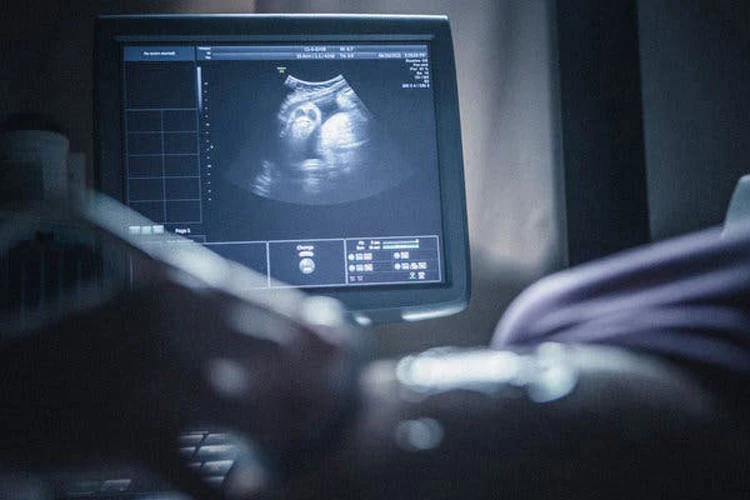
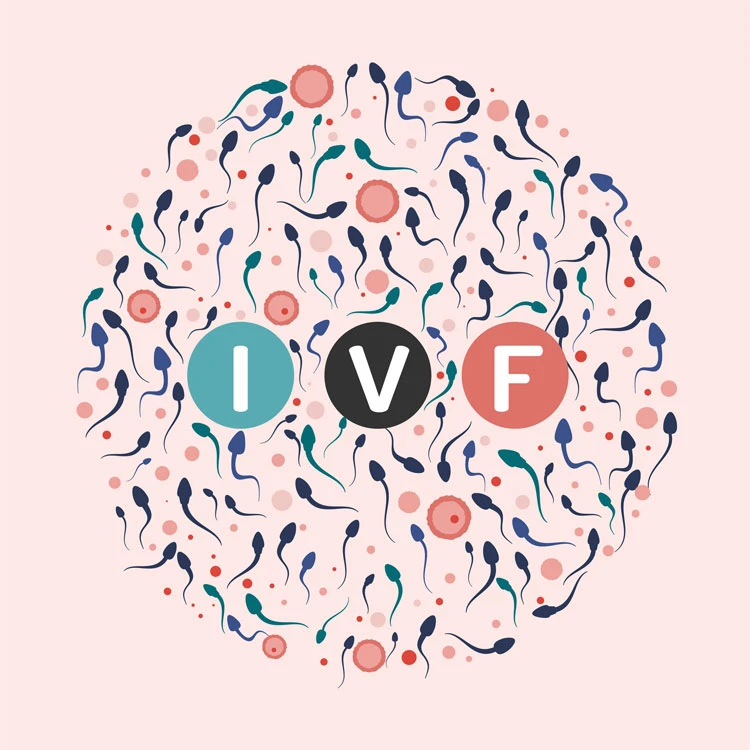
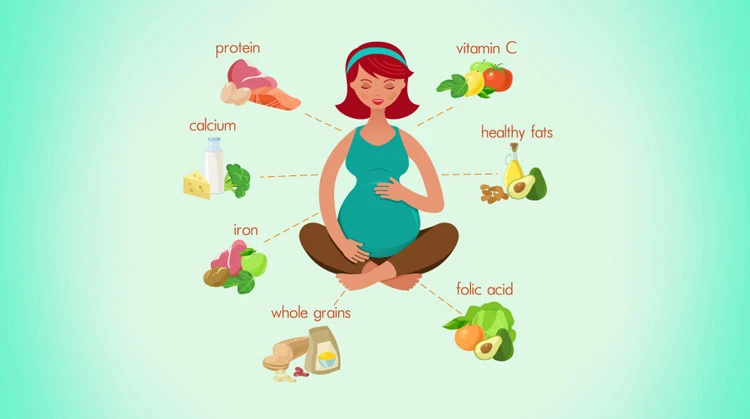
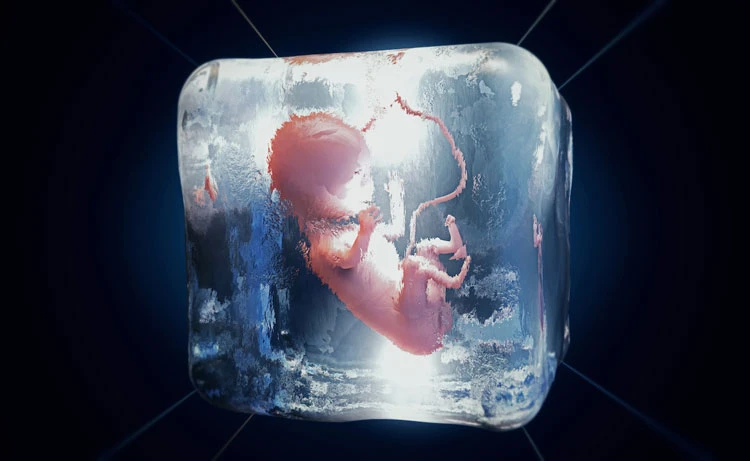

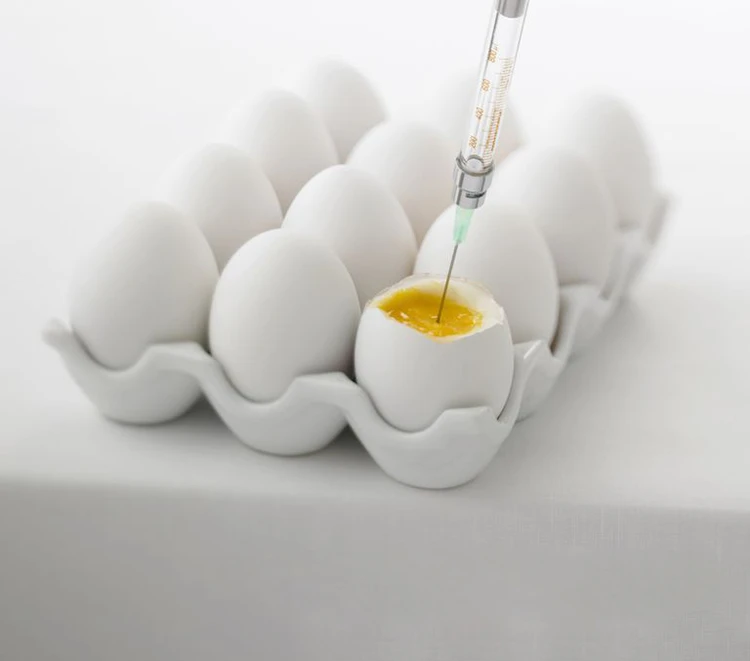
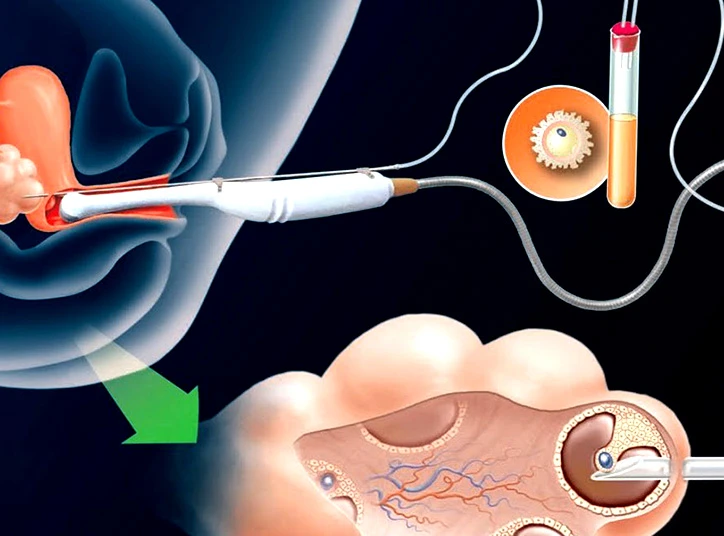

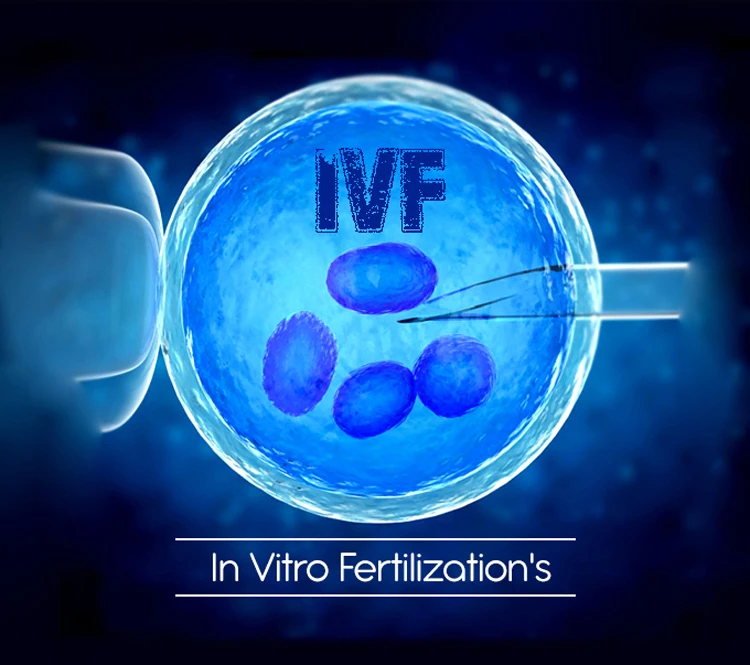

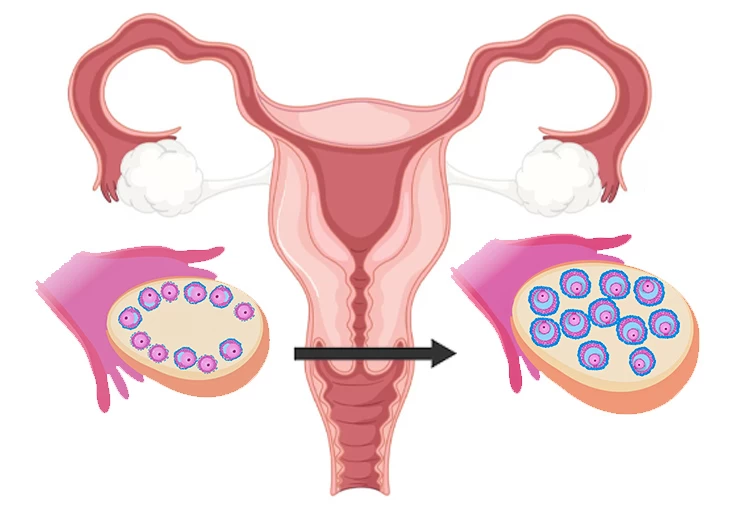

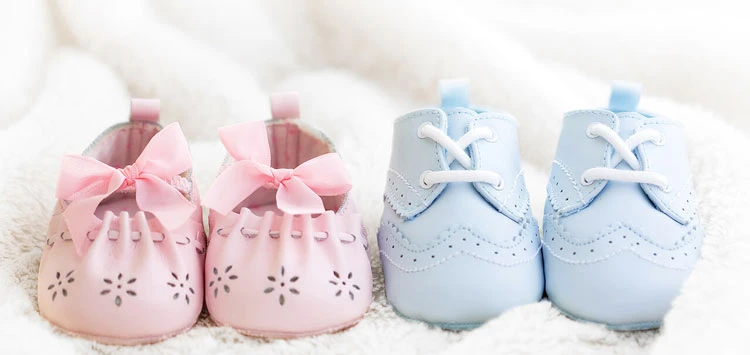
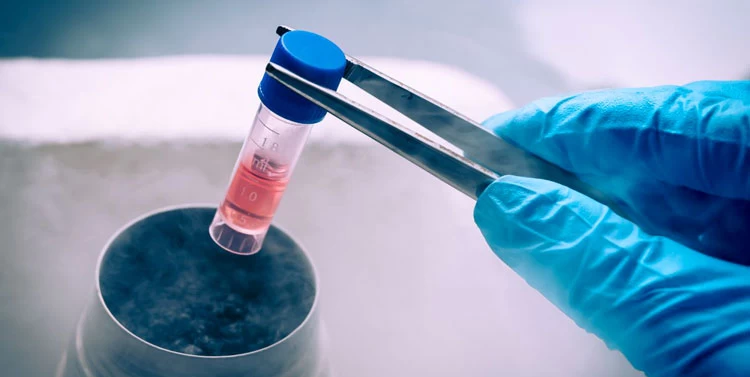

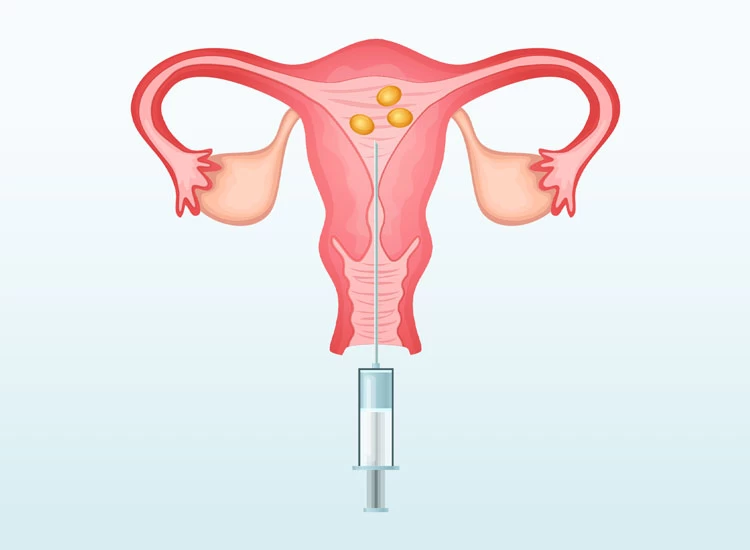
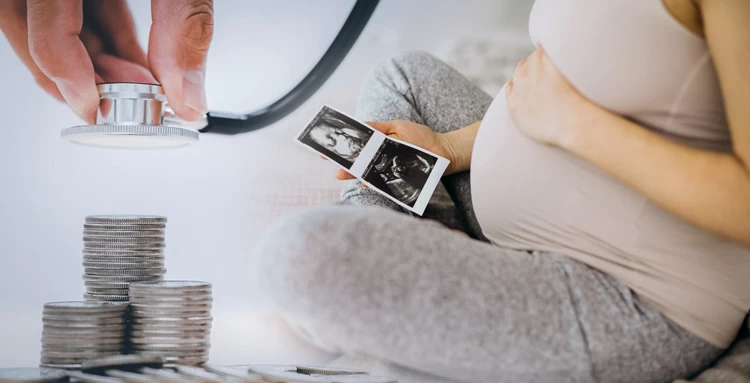


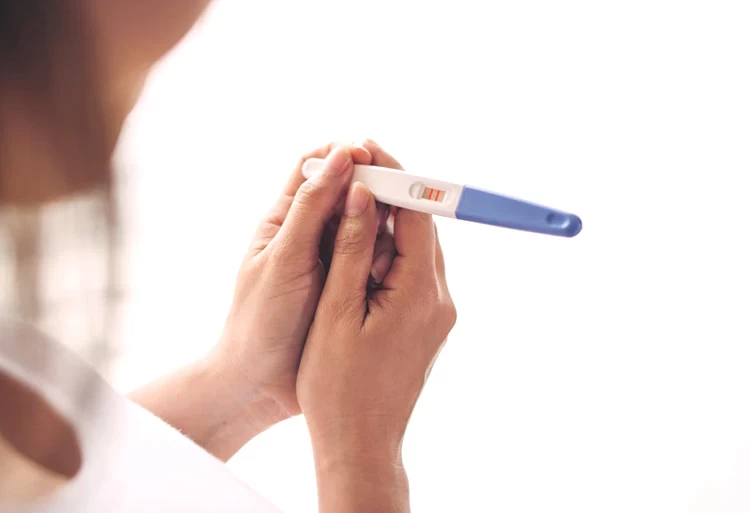
No reviews
Your comment